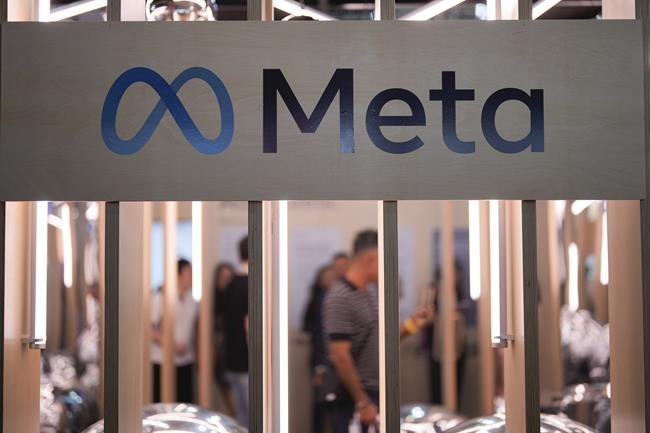MONTREAL — Pulling ads from Facebook could prod Meta toward inking deals with news outlets, though more momentum would be needed to push it over the edge, experts say.
The tactic adopted by several governments and companies in Canada this week might force the social media giant's hand if other countries and corporations follow suit in larger markets, said Sam Andrey, managing director of the Dais at Toronto Metropolitan University.
"I thought it was interesting how quickly a bunch of organizations and governments followed, and I'm sure there will be more," he said.
"The government of Canada by itself as an advertiser is not a huge material loss for them in the scheme of their total Canadian advertising. But if it kicks off a movement then you could see them reconsidering."
The federal government — followed swiftly by the province of Quebec, the City of Montreal and media companies Quebecor Inc. and Cogeco Inc. — said Wednesday they would suspend advertising on Facebook and Instagram as tensions with tech titans rise over the Online News Act.
Bill C-18, passed in June but not set to take effect until late December, forces digital giants to pay media outlets for content they share or repurpose on their platforms.
In response, Meta and Google announced last month they would remove news by Canadian journalism outlets from their sites before the law comes into force. The removal of ads by governments and big companies marks the latest tit-for-tat move in a game of gradual brinksmanship.
Kent Walker, president of global affairs for Google and its parent company Alphabet, said in an interview last week the law is unworkable because it puts a price on links, resulting in an uncapped financial liability "that no business could accept."
A spokesperson for Meta said the regulatory process won't be able to address the changes the company wants to see, which is why it plans to remove news from its platforms.
"Unfortunately, the regulatory process is not equipped to make changes to the fundamental features of the legislation that have always been problematic, and so we plan to comply by ending news availability in Canada in the coming weeks," the California-based company said on Wednesday.
The $10 million a year that Canada's heritage minister said it spends on advertising with Facebook and Instagram amounts to a tiny fraction of Meta's US$113 billion in ad revenue last year.
Nonetheless, media watchers say Meta may have to reconsider its strategy if other governments that are crafting similar legislation — including the United States, United Kingdom and Brazil — follow Canada's lead.
"Other democratic countries such as United States, Mexico, the EU could all take some similar principled steps," said Courtney Radsch, director of Center for Journalism and Liberty, a Washington, D.C.-based think tank.
A parallel reaction in the corporate world could carry weight as well — as much for reasons of self-interest and perception as principle.
"I think that brands recognize the value that news provides them. And there are studies showing that consumers have a better perception of brands that advertise by news," Radsch said.
The six-month period before the bill comes into effect gives Ottawa time to decide how to proceed with regulations.
The Canadian approach identifies companies through a regulatory process by the Canadian Radio-television and Telecommunications Commission, an arm's-length regulator, based on their size, strategic advantage and whether they occupy "a prominent market position."
Meta may be using Canada as a cautionary tale to other countries, Andrey suggested.
"They are worried about this spreading from Australia — and now to Canada — to much larger jurisdictions," he said.
"We just have the unfortunate position of being a test case for them. If they can make it hurt here, will others not want to follow? It's bullying tactics."
Meta has said pulling news links simply puts it in line with the law.
Beyond dollars and cents, reputations are also at stake.
"There’s already concern about the spread of disinformation and conspiracy theories. If you remove authoritative news sources, do you feed that perception that the information on these platforms isn’t credible?” Andrey asked.
Whether social media users care is another matter. The disappearance of ads from a handful of Canadian governments and telecoms may not grab the attention of teens on Instagram. But if bigger, hipper retail brands or celebrities chimed in, and especially if the user experience were altered, the tide could start to turn.
CBC News editor-in-chief Brodie Fenlon released an article this week describing how he was unable to see posts on its Instagram page, which noted the content was blocked "in response to Canadian government legislation."
“Once those roll out, people will care about that, because it’s adding friction to their internet experience," Andrey said.
The timing is awkward for Meta, which on Thursday launched Threads, a text-based app intended as a rival to Twitter as that platform faces turbulence following Elon Musk's takeover in October.
"Twitter for many years was the place to go to discuss news and current events. Meta is leaning into this space," Andrey said. "But if the users in Canada are not going to be able to link to news, then it’s a different type of platform.
"I think it presents real risks for Meta," he said.
—With files from Tara Deschamps in Toronto and Mickey Djuric in Ottawa
This report by The Canadian Press was first published July 6, 2023.
Companies in this story: (TSX:QBR.B, TSX:CGO)
———
Meta funds a limited number of fellowships that support emerging journalists at The Canadian Press.
Christopher Reynolds, The Canadian Press



